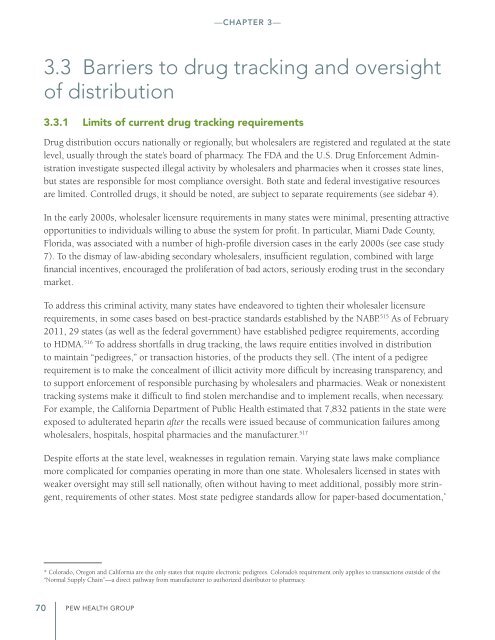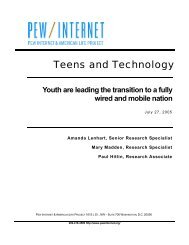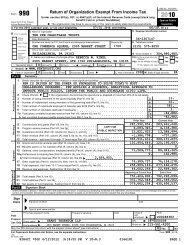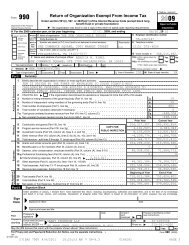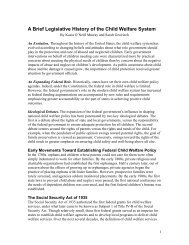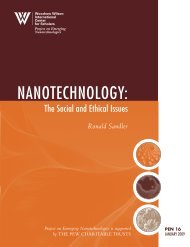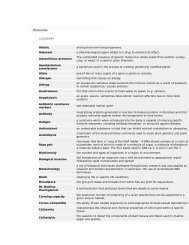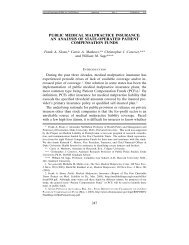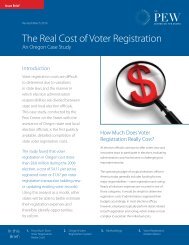After Heparin: - The Pew Charitable Trusts
After Heparin: - The Pew Charitable Trusts
After Heparin: - The Pew Charitable Trusts
Create successful ePaper yourself
Turn your PDF publications into a flip-book with our unique Google optimized e-Paper software.
—Chapter 3—<br />
3.3 Barriers to drug tracking and oversight<br />
of distribution<br />
3.3.1 Limits of current drug tracking requirements<br />
Drug distribution occurs nationally or regionally, but wholesalers are registered and regulated at the state<br />
level, usually through the state’s board of pharmacy. <strong>The</strong> FDA and the U.S. Drug Enforcement Administration<br />
investigate suspected illegal activity by wholesalers and pharmacies when it crosses state lines,<br />
but states are responsible for most compliance oversight. Both state and federal investigative resources<br />
are limited. Controlled drugs, it should be noted, are subject to separate requirements (see sidebar 4).<br />
In the early 2000s, wholesaler licensure requirements in many states were minimal, presenting attractive<br />
opportunities to individuals willing to abuse the system for profit. In particular, Miami Dade County,<br />
Florida, was associated with a number of high-profile diversion cases in the early 2000s (see case study<br />
7). To the dismay of law-abiding secondary wholesalers, insufficient regulation, combined with large<br />
financial incentives, encouraged the proliferation of bad actors, seriously eroding trust in the secondary<br />
market.<br />
To address this criminal activity, many states have endeavored to tighten their wholesaler licensure<br />
requirements, in some cases based on best-practice standards established by the NABP. 515 As of February<br />
2011, 29 states (as well as the federal government) have established pedigree requirements, according<br />
to HDMA. 516 To address shortfalls in drug tracking, the laws require entities involved in distribution<br />
to maintain “pedigrees,” or transaction histories, of the products they sell. (<strong>The</strong> intent of a pedigree<br />
requirement is to make the concealment of illicit activity more difficult by increasing transparency, and<br />
to support enforcement of responsible purchasing by wholesalers and pharmacies. Weak or nonexistent<br />
tracking systems make it difficult to find stolen merchandise and to implement recalls, when necessary.<br />
For example, the California Department of Public Health estimated that 7,832 patients in the state were<br />
exposed to adulterated heparin after the recalls were issued because of communication failures among<br />
wholesalers, hospitals, hospital pharmacies and the manufacturer. 517<br />
Despite efforts at the state level, weaknesses in regulation remain. Varying state laws make compliance<br />
more complicated for companies operating in more than one state. Wholesalers licensed in states with<br />
weaker oversight may still sell nationally, often without having to meet additional, possibly more stringent,<br />
requirements of other states. Most state pedigree standards allow for paper-based documentation, *<br />
* Colorado, Oregon and California are the only states that require electronic pedigrees. Colorado’s requirement only applies to transactions outside of the<br />
“Normal Supply Chain”—a direct pathway from manufacturer to authorized distributor to pharmacy.<br />
70<br />
<strong>Pew</strong> Health Group


